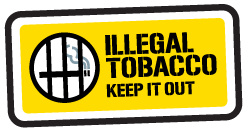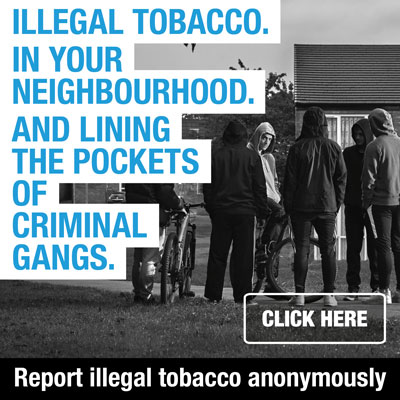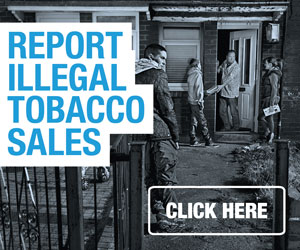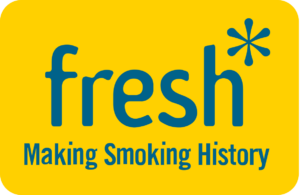The illegal tobacco market – what does the tobacco industry say?
In Greater Manchester we are making smoking history at a faster rate than in any other major city region in the world [1]. The crackdown on illegal tobacco is part of our wider efforts to cut smoking rates and make smoking history for future generations. All tobacco kills, but illegal tobacco gets kids hooked on a lethal addiction and its cheaper prices undermine smokers’ attempts to quit.
The eight-part ‘Greater Manchester tackling illegal tobacco for better health’ programme aims to reduce the supply and demand of illegal tobacco and involves partners from across Greater Manchester working together. One strand of the programme is to protect our work from the tobacco industry.
Kate Pike from Trading Standards North West explains why:
“One of the very difficult issues we face in tackling illegal tobacco is the role that the legitimate tobacco manufacturers play. If that comes as a surprise to you, you’re not alone.
Smoking tobacco is the single most damaging thing you can do to your body. Cigarettes, when used exactly as intended by the manufacturer will kill more than 1 in 2 long term users [2]. Legal tobacco manufacturers need to replace their customers who unfortunately die much earlier than the majority of the population. They do this by recruiting new replacement smokers and encouraging those who may stop using their product to continue smoking.
But unfortunately for them, government policies across the world work against this recruitment and retention strategy. There are a number of deterrents in place. Governments bring in legislation to prevent the sale of tobacco to children, they de-normalise smoking through encouraging smoke-free places and remove the visible signs of tobacco products in shops, and also ensure that tobacco products can’t be positioned as attractive through advertising and packaging to appeal to children. However, the World Health Organization says that increasing the price of tobacco through higher taxes is the single most effective way to encourage tobacco users to quit and prevent children from starting to smoke [3]. Therefore, governments also increase taxation which increases the price to the potential new or current customer.
So, with that in mind, how do tobacco manufacturers recruit new smokers and retain current ones? If there was a way for tobacco companies to get their products to consumers at a cheaper price, not hampered by regulation, what would be their perspective? Is the illegal tobacco trade actually really helpful to the tobacco industry? Then why do they shout about it so loudly and so often?
Let’s have a look at what they say and check the facts:
What the tobacco industry says: The illegal tobacco market is out of control and it’s primarily because of taxation [4]
Why do they say it? This myth is used all the time especially in the lead up to a budget to try to persuade governments not to increase taxes. Not just in the UK but across the world. [5] The industry is aware of the World Health Organization position that increasing the price of tobacco through higher taxes is the single most effective smoking deterrent. However, anything that “encourages tobacco users to quit and prevents children from starting to smoke” is not wanted.
Fact: The increasing cost of cigarettes has not led to an increase in illicit trade. The illegal market in the UK has actually shrunk in the last 20 years – from 17 billion cigarettes consumed in 2000 to 2.5 billion cigarettes in 2019 [6] – despite cigarette pack prices increasing by 265% [7]
What the tobacco industry says: Standardised packaging has led to a huge increase in the illegal tobacco market [8]
Why do they say it? This argument is used when the government considers introducing any new policy to protect children and adults from smoking harm, particularly where that policy is likely to lead to fewer smokers (fewer customers)
Fact: Since standardised packaging was introduced, “legal” sales have decreased while there has been no corresponding increase in consumption of illegal tobacco [9] [6]
What the tobacco industry says: Unlike our high-quality genuine cigarettes, illegal cigarettes contain rat droppings, sawdust, asbestos and other ingredients which make them really dangerous. [10]
Why do they say it? This argument helps to position the tobacco industry’s products as less unpleasant and not dangerous. It is often used in conjunction with the other arguments above to try to deter tax increases or new policy measures.
Fact: All tobacco kills – there is no way of knowing whether your death will be quicker or slower and more or less painful from smoking illegal rather than legal cigarettes. [11] All the evidence shows that the dangerous substances are present in both legal and illegal tobacco.
What the tobacco industry says: Illegal cigarettes are fakes or counterfeit and are made in unregulated factories. [11]
Why do they say it? This helps to distance the tobacco industry from the illegal trade and suggests that their products are ‘better’ as they are made in regulated conditions.
Fact: Yes, some of the cigarettes on the illegal market are fake or counterfeit. Many more illegal cigarettes are manufactured by legitimate tobacco manufacturers – the vast majority, according to the World Customs Organization [12] – and somehow slip out of the legal supply routes into the hands of organised criminals who then smuggle them into the UK to sell at cheap prices. The legitimate manufacturers benefit from the profit they make when they sell to a distributor and historically they have facilitated smuggling for their own financial gain [13]
The crackdown on illegal tobacco is not just about the impact on our health- while tobacco companies are part of the problem with the illicit market, organised criminal activity with links to human trafficking, the drugs trade and loan sharks is also part of the problem. So tobacco bought on the illegal market helps bring crime into Greater Manchester and exploits vulnerable people. You can find out more by watching this video: https://youtu.be/pvXWIWeIuKs
For further evidence of tobacco manufacturers’ relationship with illegal trade visit https://tobaccotactics.org/wiki/tobacco-smuggling/
If you know where illegal tobacco is being sold, you can report it anonymously to Crimestoppers on 0800 555 111 or online at keep-it-out.co.uk.
Sources
2. https://www.bmj.com/content/328/7455/1519 and https://pubmed.ncbi.nlm.nih.gov/23107252/
3. https://www.who.int/tobacco/mpower/raise_taxes/en/
5. https://academic.oup.com/ntr/advance-article-abstract/doi/10.1093/ntr/ntaa191/5920056
6. https://www.gov.uk/government/statistics/measuring-tax-gaps-tables
7. https://www.ons.gov.uk/economy/inflationandpriceindices/timeseries/czmp
8. https://www.jti.com/news-views/plain-packaging-fails-on-all-fronts-again
9. https://tobaccocontrol.bmj.com/content/early/2020/07/16/tobaccocontrol-2019-055387
10. https://www.jtiadvance.co.uk/DontBeComplicit#the-impact
11. https://www.mirror.co.uk/news/uk-news/gangs-making-millions-smuggling-menthol-22416137
12. https://www.judiciary.uk/wp-content/uploads/2016/05/bat-v-doh.judgment.pdf
13. https://tobaccoatlas.org/topic/illicit-trade/
14. https://tobaccocontrol.bmj.com/content/28/2/127




